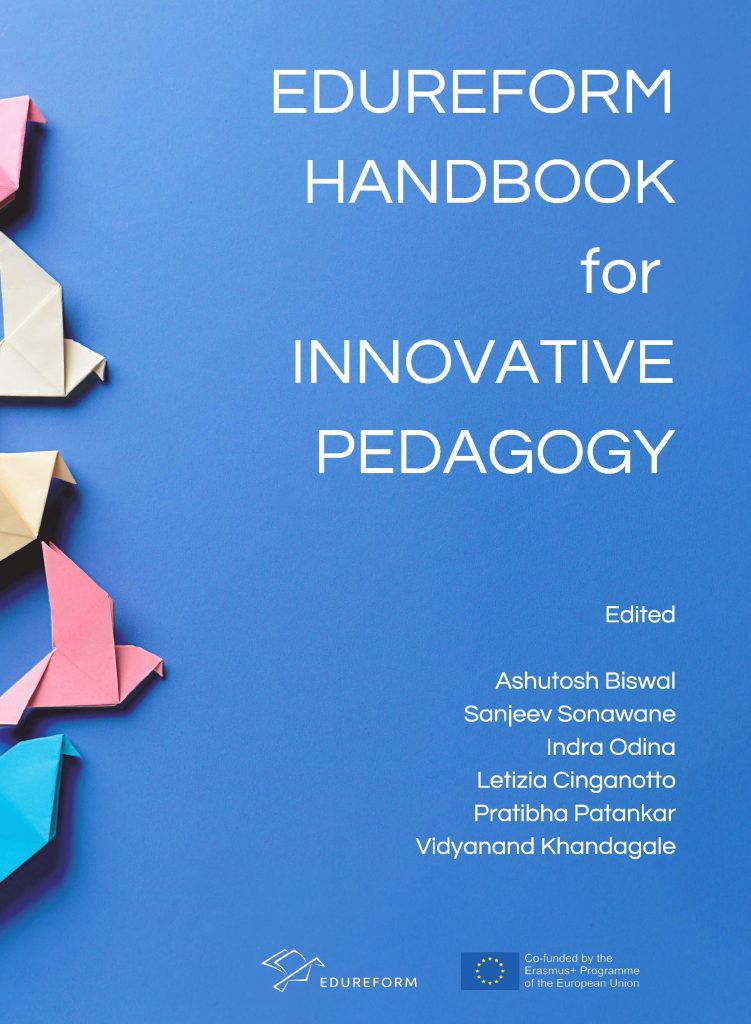The EDUREFORM Handbook for Innovative Pedagogy
What a beautiful journey EDUREFORM is, from researching, curating and gathering the best pedagogical tools to prepare students to thrive in times of the 4th Industrial Revolution to finally publishing our Handbook containing all the 22 pedagogies.
We could not feel prouder of the hard work and determination of our Consortium that has made this wonderful book a reality. It has been a long process of authoring, editing and reviewing to collate in the best manner the knowledge and expertise of the project to improve the quality of education in India and beyond.
Our EDUREFORM Handbook for Innovative Pedagogy is the perfect manual for teachers to become facilitators in the 21st century. The Handbook equips teachers and educators with the right information and guidelines to use our innovative pedagogies and to feel ready to nurture creativity, critical and analytical thinking skills in their classrooms.
A special thank you to our first-class Board of Editors composed of: Ashutosh Biswal, Sanjeev Sonawane, Indra Odina, Letizia Cinganotto, Pratibha Patankar and Vidyanand Khandagale. Your guidance, support and knowledge has borne fruit into a wonderful book. More importantly, EDUREFORM continues day by day disseminating its expertise and achievements so that they can reach out to a maximum number of educators around the world.

Foreword | Page 3
Index | Page 4-5
Introduction | Page 6-16
Acknowledgment | Page 17
Chapter 3 | 41-58 pages
Computational Thinking: A Pedagogical Approach for Constructive Classroom
ByVidyanand Khandagale
Chapter 4 | 59-68 pages
Concept Formation for Enhancing Students’ Analytical, Creative, and Critical Thinking Skills
ByIndra Odina & Anna Stavicka
Chapter 7 | 93-100 pages
Elisir and Poison
ByPatrizia Fazzini, Marco Ghelardi & Francesco Maria Marelli
Chapter 9 | 112- 120 pages
Innovation pedagogy as a tool to solve challenges with teamwork
ByEssi Silvennoinen & Graham Burns
Chapter 10 | 121-127 pages
Heads and Tails for Enhancing Students’ Critical Thinking Skills
By Indra Odina
Chapter 11 | 128-144 pages
Integrated and Interactive Lesson Plan
ByDr Niyati, Chitkara, Dr Parul Sood, Dr Sangeeta Pant, Ms Dolma Pathela and Ms Piyusha Sharma
Chapter 14 | 177-190 pages
Multi-Perspective Teaching: Nurturing Analytical, Critical & Creative Thinkers
ByNiyati Chitkara, Dr Honey Chitkara, Ms Dolma Pathela and Ms Piyusha Sharma
Chapter 15 | 191-205 pages
OPEN BOOK ENVIRONMENT (OBEnv): A Tool for Developing Critical and Creative Thinking
ByAshutosh Biswal & Jaishree Das
Chapter 17 | 225-237 pages
The product process analysis – A tool to develop critical, creative and systemic thinking skills
BySören Schütt-Sayed & Andreas Zopff
Chapter 19 | 253-263 pages
TEAL (Technology Enhanced Active Learning) for STEAM, humanities and CLIL
ByLetizia Cinganotto
Chapter 21 | 275-288 pages
The Teaching Interplay for honing analytical, critical, and creative thinking skills – Instructing to Learn with In-service Pre-service Teachers
ByDr Niyati Chitkara, Dr Parul Sood, Dr Honey Chitkara, Ms Dolma Pathela and Ms Piyusha Sharma
Chapter 22 | 289-294 pages
1+1=1 The path to the invisible
ByPatrizia Fazzini, Marco Ghelardi & Francesco Maria Marelli
Chapter 23 | 295-306 pages
Resilience and coping styles for transformative teaching and learning
ByPatrizia Garista